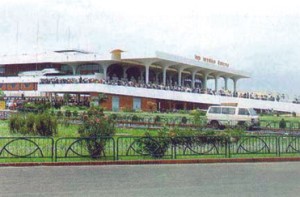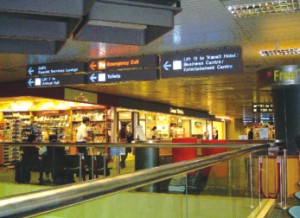| Travel
Down to Earth
Andrew Morris
Airports, it occurs to me as I wait outside Zia International Arrivals for my better half to drop out of the sky, are a bit like hotels.
At the top end there are those five-star places such as Singapore, which specialise in providing a sense of luxury, catering to needs you never even knew you had. There, for example, among the green ferns, the classy boutiques, the Japanese garden with its little bridge, the tinkly music, your eyes travel up the escalator to the business lounge. On a sign advertising such enticements as “Massage” and “Fully-equipped gym”, there is a vital new product: “Oxygen” (complete with a cool, understated “O” logo), at a mere “$15-$23.” When they start selling you oxygen surely something has gone a bit awry?
 |
Zia International Air Port. |
Meanwhile in the duty free shops that line the carpeted walkways, you enter a fantasy world bathed in golden light. There are perfumes whose names and designs alone have consumed the energies of the brightest and best the advertising industry has to offer, such as Kenzo Amour, whose blurb reads: “the bottle itself…is a stylised expression of an abstract bird. It is a symbol of love, the sensuous curves of a woman and the desire to travel.” Oh please, it's just a bit of glass.
But wait, there's more. Beyond the standard fare of alcohol, jewellery, watches, wallets and bags, you can buy some bizarre and incredibly unnecessary objects. Weirdest of all is a little item called “Spin” by the famous Danish designer George Jensen, on display at one shop counter. Admittedly, it's better than what I produced in my metalwork class in school, but still… “Spin” is a 'two-armed box” in smooth brushed metal (yours for a mere $67) large enough to hold nothing more than a pair of small cufflinks or earrings. But never mind such limitations: we are reassured it represents the infinity symbol ¥, which “perfectly counters the stress and intensity of life today”. Perhaps I should buy one for my rickshaw driver.
How have we come to this? Air travel is a fairly basic thing. People take off, and they land. Families, couples and friends are torn apart and reunited. There is pain and joy, fear and excitement, loneliness and solidarity. But these are possibly not emotions we wish to confront face to face, so we need distraction. And increasingly in these days of heightened security, there are long waits, and long waits mean boredom to the modern mind unaccustomed to spending time with itself. This is ideal hunting territory for those who wish to relieve us of our money and enhance their profits. Like vultures, they have swooped down and suddenly our airports have come to resemble shopping malls rather than departure halls.
Duty Free was once a convenient way for people to satisfy their vices at a cut-price cost, stocking up on cigarettes and alcohol. Today at an airport like Heathrow you can buy a thousand different products, very few of which are related to travel. Who for example could possibly need a pair of luxury shoes while at an airport? Only people dumb enough to have forgotten to put their shoes on in the first place. But purveyors of such goods know very well that there is a sort of pre-travel elation which can lead all too easily to reckless purchases.
At the other end of the scale there are those airports the equivalent of cheap hotels where you are reluctant to get into bed at night for fear of what other creatures may be lurking there. Yet while they may be grimly bare, from another perspective there is something almost refreshing in their simplicity. We once landed at an airport in Albania whose departure and arrivals hall was a forbidding concrete bunker, a place which seemed more suited to an interrogation than to the start of a journey. There was a shop in the corner which seemed to sell nothing except dark tea and biscuits made of cardboard. At least it was a cheap afternoon, full of conversation rather than the pursuit of unneeded trophies. And once, even better, we flew into an airport in the Horn of Africa whose arrivals hall was actually made of large twigs. Not a Georg Jensen cufflink-holder in sight, but we still managed to occupy ourselves.
The good news is that our very own international airport here is neither a five-star oasis nor a fleapit budget inn. Rather it's like one of those guesthouses dotted all over Gulshan: neat, clean, functional and personable. There are no Japanese bridges and few ferns, but you somehow survive without either. Besides, it's well-lit, reliable and there's always a plentiful supply of completely free oxygen.
It's a place where owing to the lack of distraction, there is space to think, and you can meet your basic needs without becoming a victim of consumerism. If you're hungry you can eat, and if thirsty you can drink, but nowhere, mercifully, can you indulge your desire to win a Rolls-Royce or buy a new kitchen. Who knows how long this refreshing state of affairs will last? Enjoy it while you can.
Above all, after queueing for hours in airports like Kolkata, where they seem to reduce their staff numbers in directly inverse proportion to the number of people waiting to get in or out, I'm always impressed by the efficiency and the friendliness of the employees at Zia. And when they actually begin to recognise you, you realise this is no ordinary airport.
 |
Duty free at Singapore Airport. |
This fine morning of course, I find myself outside the building rather than enjoying its interior, but here too there is evidence of careful planning and moderately efficient management. There is an impressive electronic display board showing the estimated arrival times of the incoming planes. Confidence in its reliability is not helped by the fact that the clock is thirty minutes fast, but nevertheless we all hold on to its every pronouncement. It seems that planes from Pakistan and Kuwait are delayed this morning, by fifty or so minutes. The two Biman planes scheduled to arrive are marked simply with the word “Delayed.” There is no indication of by how long. Days? Decades?
The soldiers and guards on duty inside the enclosed space have a constant battle with the crowds of well-wishers, hotel employees and taxi touts who inch forward like an incoming sea, but generally they seem to cope. Waving their batons, they push you back and clear a modest space, only for everyone to move inexorably towards the arrivals hall again once their backs are turned. Often these guards pass me by as a foreigner, but I take a guilty step backwards anyway. The cleaners and the porters have clearly coloured uniforms, which helps the hapless traveller much more than the way things used to be, when you were immediately waylaid on arrival by a thousand offers of unwanted help from assorted bystanders.
Such crowd management also has its bleak side: beyond the enclosed space outside the arrivals hall, the most striking sight, as ever, is of the silent crowds pressed up against the railings. Many first-time travellers to Dhaka speak of being amazed by the sheer number of people, silhouetted in the harsh light of early morning, a vast and wordless welcome committee. Some have flung their arms up against the railings, desperate for a change of position as they wait and wait for their relatives to come home. There is always something intriguing about the stoic patience of this crowd, which never seems to melt away: these dispossessed, denied access even to the waiting areas. Not for them the quick mobile call to the waiting driver, the sleek car sweeping into the driveway. This place is just another milestone in an arduous day. It promises reunion, and quite possibly the hope of substantial gifts brought from afar, but then a return to a life of grinding hardship.
But as my eyes are drawn once again to the doors when they finally open and our long-awaited travellers stream through just half an hour after landing, it seems safe to conclude on the whole that it's not a bad airport we have here. Neither five-star nor no-star, it does the job, and each time you travel you can arrive and leave with your spirits, and your wallet, intact. What more could you ask for?
Copyright
(R) thedailystar.net 2007 |
|
